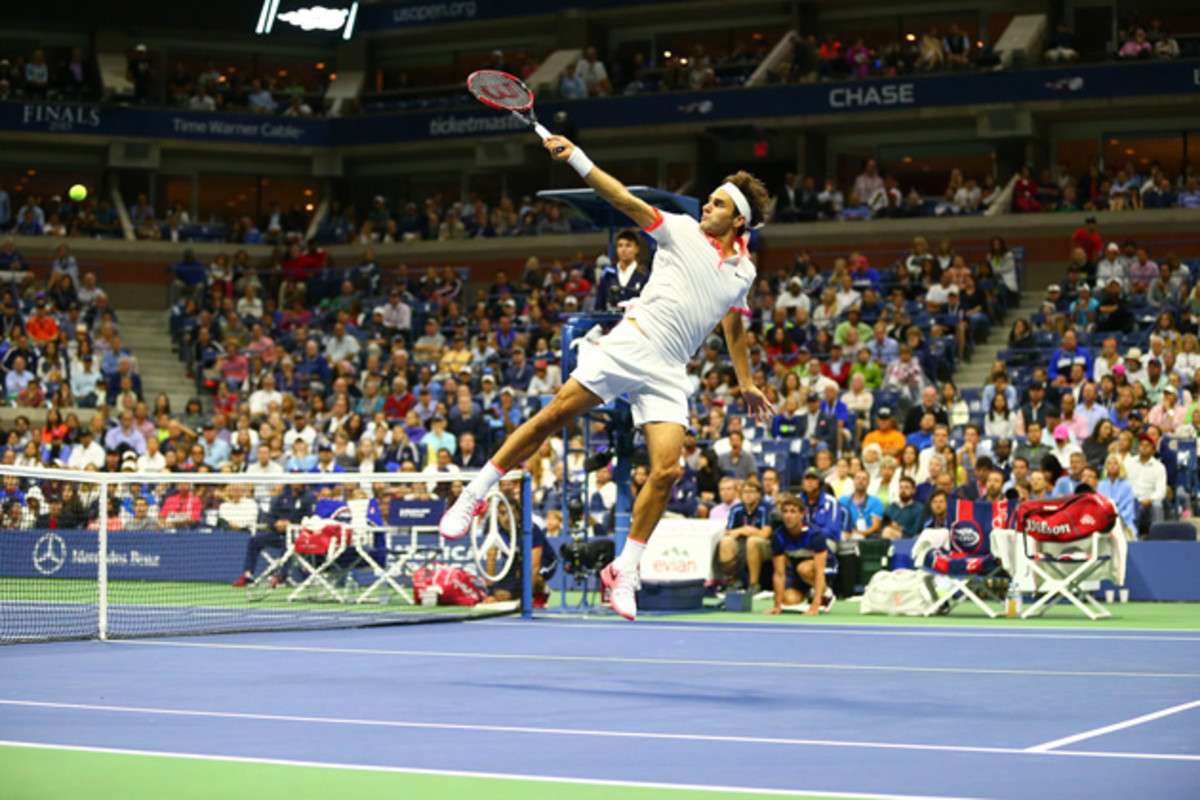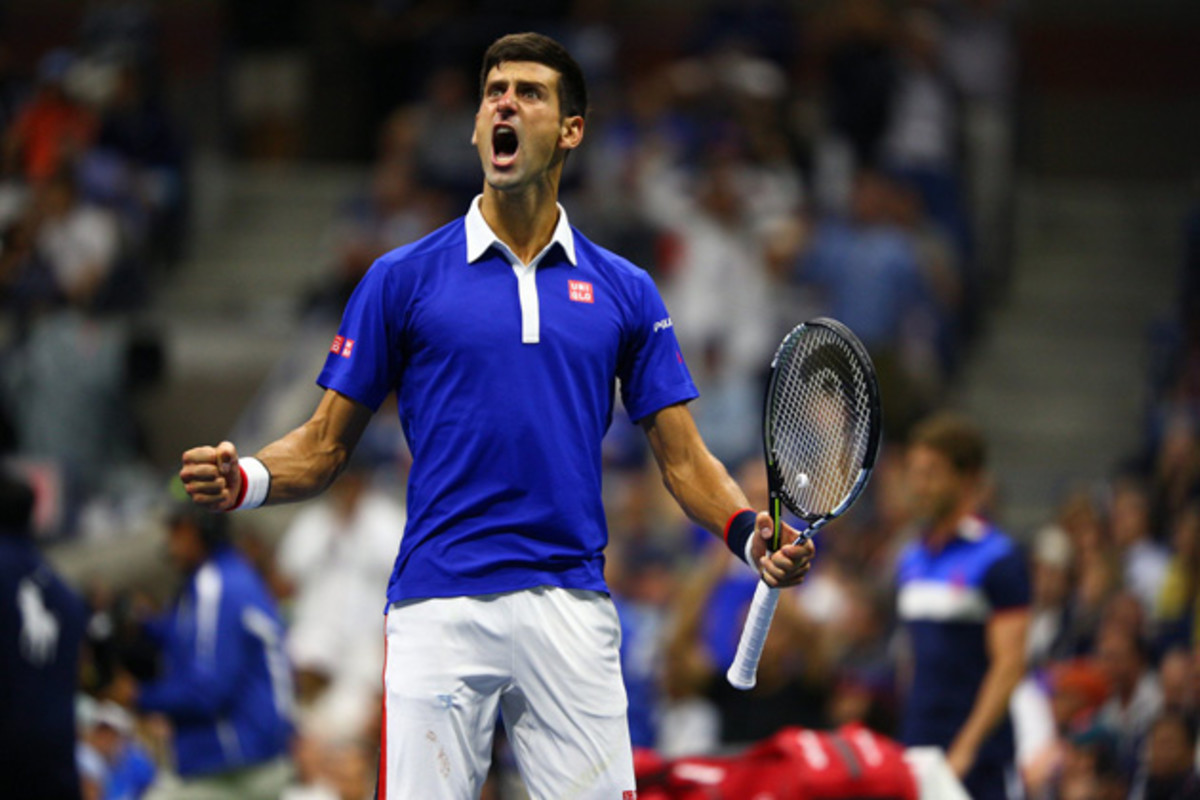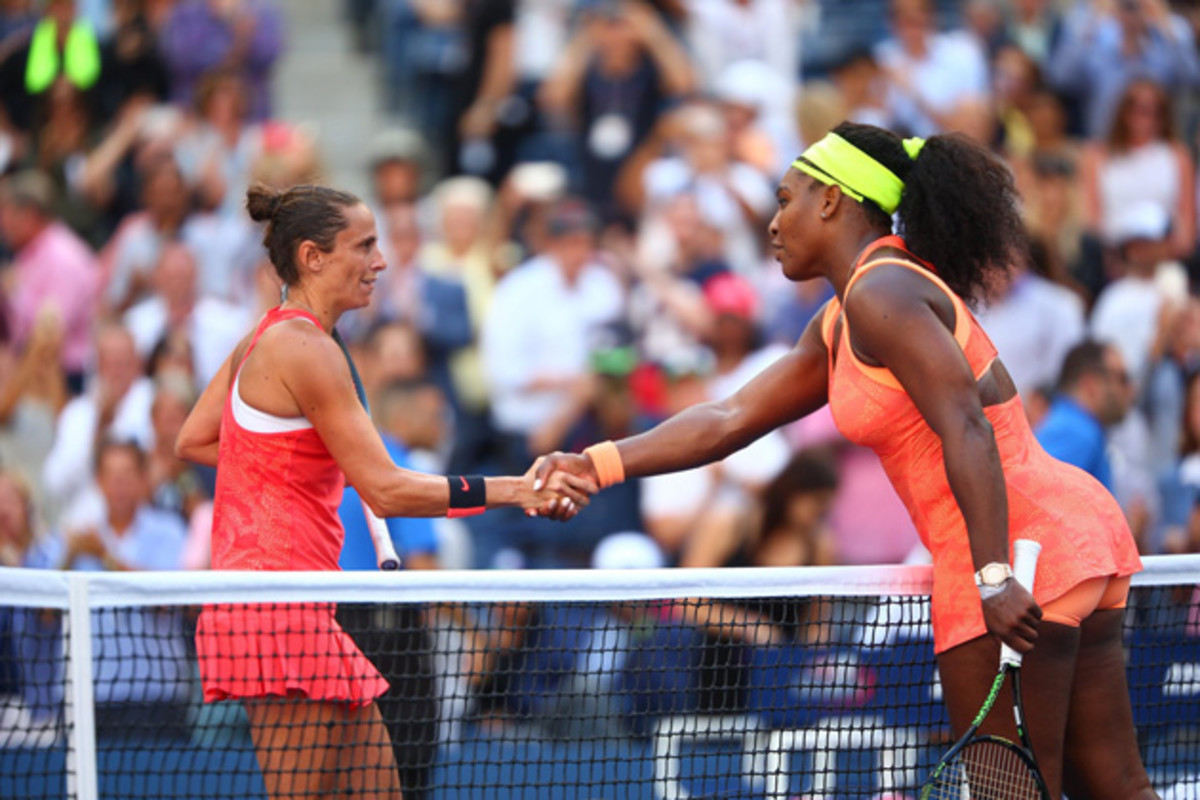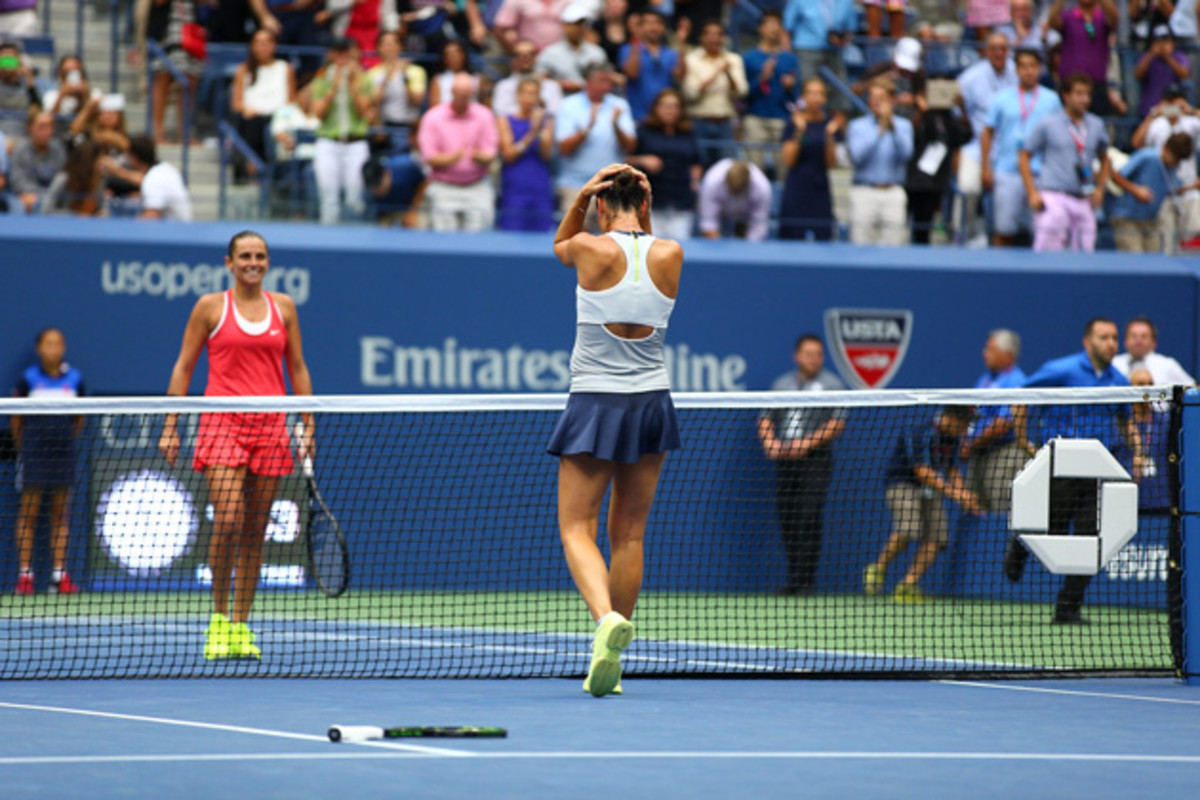Pressure points: Hostile crowds, history were impactful at U.S. Open

This story appears in the Sept. 21, 2015, issue of Sports Illustrated. Subscribe to the magazine here.
It can be a tough room, Arthur Ashe Stadium. The 23,000 fans that wreath the court come to be entertained. They want their chosen favorites in the U.S. Open to succeed. The more the performers seek audience approval, however, the less likely it is to be granted. Rough crowd, rough crowd.
Novak Djokovic might be a peerless tennis player, the clear-cut No. 1, the reigning Wimbledon champ, the kind of citizen-of-the-world who attends a black-tie function at the U.N. on the eve of the tournament. A player whose biggest sin might be ripping his shirts in mid-match acts of self-flagellation. But he is not American. Nor is he Rafael Nadal or Roger Federer. He is not a magician; he's merely a technician who plays immaculate tennis. So it is that—for all his excellence, for all his popularity elsewhere in the tennis circuit, for all the ground he's gained on the sport's historical records—Djokovic has played to meh reviews in New York.
An inspired Djokovic stops Federer's momentum to win U.S. Open title
Crowds, though, can be won over. And late Sunday night, after subduing the overwhelmingly more popular Federer in a classic U.S. Open final, Djokovic made inroads at last. After hugging his team and wife Jelena in the stands, he made his way back onto the court. As he passed the masses, the same fans who'd been booing him and yelling out when he served or cheering when he double-faulted were now straining to pat him on the back and zap selfies. Finally there was some admiration—even if the grudging variety—for the performance they had just witnessed.
Djokovic hadn't simply won the tournament for the second time. He hadn't simply overcome both a motivated adversary across the net and 23,000 or so adversarial fans above him. He'd offered a 200-minute demonstration of his subtle greatness. That is how he's won 10 majors during the reign of Federer and Nadal, venturing ever further into tennis's GOAT (Greatest of All Time) pasture.
Hitting the ball past an opponent is one way to win matches. But making the opponent press is another. Djokovic's I-know-your-password anticipation and defense is so maddening, his play on big points so stingy, that it forces players to recalibrate their risk-reward ratio. "You end up going for too much," says 2014 U.S. Open champ Marin Cilic, whom Djokovic waxed 6–0, 6–1, 6–2 in the semifinals, "because that's the only way you can win."

The world's No. 2 knows this all too well. For the first six rounds in New York, every day was #ThrowbackThursday, with Federer, now 34, no longer at the peak of his powers, impersonating the guy who dominated a decade ago. Before the finals he'd dropped zero sets and unsheathed a new tactic, acronymed SABR—Sneak Attack By Roger—that entailed charging in on opponents' second serves, turning his returns into approach shots. In truth, SABR was of limited pragmatic value—good, at most, for a few points each match. But the symbolic value was immeasurable, an indication that Federer is not just still out there; he's down in the basement innovating, tinkering, trying to come up with new ways to improve.
In the final, though, neither SABR nor other weapons were enough to penetrate Djokovic's defense. Like all the others, Federer allowed himself only the smallest of margins, aiming for the lines. When he hit his targets, he gave himself chances to win his 18th major and delight the crowd. But Djokovic made Federer cave when it mattered most, causing the five-time U.S. Open champion to miss 19 break point opportunities, and closed out an enthralling match 6–4, 5–7, 6–4, 6–4. "I had too many break chances that I didn't capitalize on," said Federer. "One after the other after the other. I should have done better and could have done better."

With a laughable match record of 63–5 in 2015, Djokovic is rounding out one of the all-time great seasons in tennis history. Suddenly it is the Djoker who has turned in the best Grand Slam campaign of '15. Which is a considerable upset because throughout the summer and much of this event, the prominent, dominant theme was whether Serena Williams could achieve the Grand Slam, winning all four majors in a single year. In the semifinals the answer came in the form of a resounding "No."
The music ended without a soaring crescendo. History was thwarted not with a spectacular act of violence—a strafing ace or a whistling ground stroke—but with a half volley, a shot that demands delicacy and a feathery touch. At around 3 p.m. last Friday, Roberta Vinci tiptoed near the net and barely brushed the ball with her racket, depositing it gently on Serena's side of the court, where it bounced multiple times and died a quiet death.
With that small bit of shotmaking, one of the greatest upsets in tennis had been consecrated. And the tenor of the 2015 U.S. Open, the tennis season and (trafficking in only minor exaggeration) the year's entire sportscape changed dramatically. Throughout the tournament the conventional wisdom was that the player with the best chance of beating Serena Williams is Serena Williams. And here, in the semifinals—just two matches to win and pull off one of the most formidable feats in sports—that's precisely what happened. Paralyzed by nerves, moving so sluggishly it looked like cinder blocks had been tied to her Nikes, Serena fell 2–6, 6–4, 6–4 to Vinci, a 32-year-old Italian and career journeydonna, ranked 43rd and best known for her doubles play.
Credit Vinci. She played the match of her life and met the moment. Her consistency, slicing and sly, rhythm-resistant play made her the worst possible opponent for Williams. But this was also about Serena buckling under the weight of the occasion. Asked how tight she perceived Serena to be, Vinci smiled: "A lot."
Serena Williams finally buckles under pressure in final leg of Grand Slam bid
As Serena left the court, the gasps and groans were audible, not least in the television compound, as ratings for the final had just, inevitably, fallen sharply. But before that, Serena's tournament had been soundtracked with the much more pleasant audio: cheers. The kind that were full-throated, unqualified and without ambivalence. It reinforced this point: Serena's pursuit of the 2015 Grand Slam may have had all the earmarks of a classic quest, a hero completing a series of tasks in different regions. But at its essence, this was a love story. Which made the unfulfilling and unfulfilled ending even more of a pity.
Like most sports, tennis knows of star-crossed love, of timing gone sideways, of opportunities slipped away, of towering figures not fully appreciated until they're gone. ("Where was all this when I was playing?" Pete Sampras asked about the fans' affection during his retirement ceremony.) There are players who, after the fact, lament that they should have shown more devotion and loyalty to the sport. With Serena Williams and tennis, both parties found each other in time. When Donald Trump was spotted in a suite mouthing, "I love Serena," he was, for a change, capturing majority sentiment.
Sure, in previous years Serena and tennis were an on-again, off-again item. There were long arguments and much apportioning of blame. How much of the establishment's blaring slight of the Williams sisters was tennis's tendency for insularity (or worse) and how much owed to Serena's decision to operate opaquely on the margins? No matter; there's been reconciliation.
Fifty parting thoughts from the 2015 U.S. Open
For the first 12 days, anyway, the U.S. Open was the Serena-rama. It was her pursuit of history, with a tennis tournament tacked on. When Serena played her sister Venus, now 35, in the quarterfinals, Williams Bowl XXVII drew a capacity crowd including a celebrity cohort to rival the Oscars. Oprah, Trump, Justin Timberlake, assorted Jenners and Kardashians were there; so was tennis royalty, from John McEnroe to Martina Navratilova. As always it was a psychologically fraught affair. So much so that neither of the Williams's parents attended, while their two older sisters, Isha and Lyndrea, sat together on a couch in the players' lounge, their backs to the television. Serena won a hard-hitting match 6–2, 1–6, 6–3 amid a flat atmosphere. But as the sisters hugged at the net, it triggered a prolonged standing ovation and some of the loudest applause of the entire tournament. The unmistakable message: We get you, we are fond of you, we appreciate our good fortune in getting to watch you all these years.
And it wasn't just the fans. Remember how other players once rooted against Serena behind her back, often crowding around the locker room TVs to vocally cheer her opponents, seldom issuing much in the way of praise? No longer. In New York, player after player admitted to openly rooting for Serena to pull off the Slam. The male players were happy to stand by while the tournament was hijacked by Serena. "I want to see her do this, of course," said Djokovic. "We all want to see her do it." And the women were equally gracious. Simona Halep—the second seed, mind you—captured the mood among WTA players when she asserted, "If I will not be in the final, then I want her to win."

As tennis has embraced Serena, she has hugged back. There was a time when she professed boredom with her game. She took pains to divorce herself from tennis culture, took pride in not caring about the sport's history. She led us to believe it was only a matter of months before she would walk out on the relationship, seduced as she was by Hollywood, fashion and celebrity. As for her colleagues, she once played a game with herself, whereby she would attend press conferences and refuse to refer to any other players by name.
Today? She is a ubiquitous presence, popular in the locker room, more engaged in her mid-30s than she was in her mid-20s. Some of her best friends are other players. If she was once like an undergrad who walked around declaring her intention to transfer to a cooler school, now, as a senior, she is the student body president.
Most crucially Serena fell in love with the craft. By her own reckoning, her training sessions once varied greatly in intensity. She was famously casual about her equipment, among the last players to still use natural gut strings. She was openly dismissive of scouting, sometimes barely knowing the identity of opponents until she took the court, declaring, "I only really worry about my side of the net." See ball, hit ball was her operating philosophy. Now? Much like Djokovic, she cuts the figure of an athlete who enjoys the process as much as she does the outcome. She is almost a tennis wonk. On Sept. 8 she beat Venus. Before 9 a.m. the next morning she was back on the practice courts, going through a targeted drill in which she brought back her racket—now adorned with high-tech polyester string—to flick low-bouncing balls over the net. Why? Because she knew that Vinci would come armed with a nasty slice backhand.
Post-U.S. Open Mailbag: Closing thoughts on the final Slam of 2015
All that professionalism, though, still couldn't prepare her for the attack of nerves in the semis, what Patrick Mouratoglou, Serena's coach, termed, "A bad day, a passive day, a tight day." It hurt all the more the following day when Vinci regressed to her mean, losing to another thirtysomething Italian, Flavia Pennetta, 7–6, 6–2 in a highly entertaining if unexpected final. A well-liked and well-rounded player, Pennetta won what was, by an order of magnitude, the biggest match of her career. It was her first title of the year, her first Slam win in singles.
When Pennetta termed the tournament "dreamlike," it was neither cliché nor hyperbole. Her second-round match was interrupted when a drone crashed in the stands. (A New York City teacher, operating the drone from a nearby park, was arrested on charges of reckless endangerment.) The next night Pennetta's fiancé, the mercurial Italian player Fabio Fognini, beat Nadal in five sets. Pennetta arrived at the courts bleary-eyed the next day and lost the first set of her match 6–1 before rallying to win. She then strung together four more victories. And—presumably because her tournament needed still another drama—upon receiving the trophy last Saturday afternoon, she pulled the ultimate mike drop and declared her retirement from tennis. (A $3.3 million U.S. Open check makes for an awfully nice golden parachute.)

Serena, who turns 34 on Sept. 26, may be five months Pennetta's senior. But as with Federer, retirement is not in her immediate plans. There are still more titles to win, more ways to solidify her claim as the Greatest of All Time, a title that may be mythical but means a great deal to her. "Motivation will not be hard for her after this," says Mouratoglou.
He's right. Despite this brutal loss, his charge turned in one of the greatest seasons in sports: three major titles, a 53–3 record and a monstrous points lead in the rankings. She hits the ball as cleanly and forcefully as ever. Her legs are not diminished. Which is to say, there's no reason she can't make another run at the Slam in 2016.
After her stunning loss on Friday, Serena endured a brief exit interview. ("I don't want to talk about how disappointing it is for me.") While that was still another sign of professionalism—in previous years she might have left and eaten the fine, Marshawn Lynch–style—she was the picture of despondency. Without showering or changing clothes, headphones wrapped tight, she headed from the locker room into a black SUV, the featured guest leaving a party unfashionably early.
In her haste to depart, one hopes she took in some of the warm conditions surrounding her, metaphorically, but literally too. While the calendar said autumn was coming, it sure didn't feel like it.
